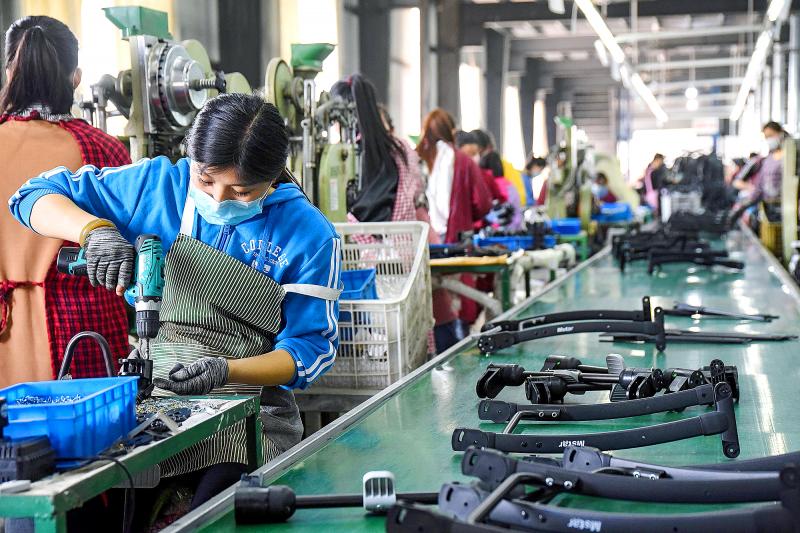Most Taiwanese firms in China plan to cut back their operations or put off investment, as most believe that the impact of the COVID-19 outbreak would persist for at least six months, a survey released yesterday by the Chinese National Federation of Industries (CNFI, 全國工業總會) found.
The trade group, which represents a majority of local manufacturing firms, sounded the alarm after polling 157 companies in July and August.
“COVID-19 has had a much worse impact on Taiwanese firms than reported in the media, and could batter the economy like a massive tsunami if the government fails to respond quickly,” the federation said.

Photo: AFP
More than 80 percent of the respondents said they took a hit from the pandemic, mainly in the form of lost orders and disruptions to goods flows.
The fallout has been most severe for small and medium-sized enterprises that have investments of US$1 million or less in China, the federation said.
About 61 percent of respondents suffered disruptions to their goods or labor flows, 47.3 percent reported overseas order losses and 30.1 percent were unable to deliver goods as agreed upon, it said.
Although the COVID-19 outbreak in China has eased, only 49.2 percent of respondents have seen their manufacturing capability restored to more than 70 percent, while the recovery rate was between 10 and 60 percent for another 43.9 percent of the respondents, it said.
About 6.9 percent of respondents said that their operations were still on hold.
Non-tech firms, such as makers of plastic and textile products, have suffered the most, with more than 90 percent of them reporting a decline in business, the federation said, adding that 68.2 percent of electronics producers had also reported a decline.
Border controls pose the biggest headache for labor flows, as 67.2 percent of Taiwanese executives posted to China have been unable to return to their jobs and 48.1 percent based in China are unable to come back to Taiwan, it said.
Just over 65 percent of the firms polled expect the pandemic to weigh on the landscape for more than six months, and consequently, 75.2 percent said they would not be increasing their investments in the next two years.
Already, 59.7 percent of respondents said that they are downsizing operations, postponing investments, furloughing staffers or cutting wages to cope with the pandemic, the survey found.
The pandemic has driven 44.2 percent to take action to diversify their market, while 38.4 percent favor a wait-and-see attitude and 33.3 percent intend to speed up their digital transformation, the federation said.
About 50 percent of respondents said they wanted Taiwan’s government to help them, and nearly 60 percent are looking at tax credits as an incentive to return operations to Taiwan, it said.
Just over half of the respondents (51.1 percent) called for looser cross-strait border controls, while 38.3 percent said they wanted to see more cross-strait flights, the federation said.

‘WIN-WIN’: The Philippines, and central and eastern European countries are important potential drone cooperation partners, Minister of Foreign Affairs Lin Chia-lung said Minister of Foreign Affairs Lin Chia-lung (林佳龍) in an interview published yesterday confirmed that there are joint ventures between Taiwan and Poland in the drone industry. Lin made the remark in an exclusive interview with the Chinese-language Liberty Times (the Taipei Times’ sister paper). The government-backed Taiwan Excellence Drone International Business Opportunities Alliance and the Polish Chamber of Unmanned Systems on Wednesday last week signed a memorandum of understanding in Poland to develop a “non-China” supply chain for drones and work together on key technologies. Asked if Taiwan prioritized Poland among central and eastern European countries in drone collaboration, Lin

The US government has signed defense cooperation agreements with Japan and the Philippines to boost the deterrence capabilities of countries in the first island chain, a report by the National Security Bureau (NSB) showed. The main countries on the first island chain include the two nations and Taiwan. The bureau is to present the report at a meeting of the legislature’s Foreign Affairs and National Defense Committee tomorrow. The US military has deployed Typhon missile systems to Japan’s Yamaguchi Prefecture and Zambales province in the Philippines during their joint military exercises. It has also installed NMESIS anti-ship systems in Japan’s Okinawa

The Chien Feng IV (勁蜂, Mighty Hornet) loitering munition is on track to enter flight tests next month in connection with potential adoption by Taiwanese and US armed forces, a government source said yesterday. The kamikaze drone, which boasts a range of 1,000km, debuted at the Taipei Aerospace and Defense Technology Exhibition in September, the official said on condition of anonymity. The Chungshan Institute of Science and Technology and US-based Kratos Defense jointly developed the platform by leveraging the engine and airframe of the latter’s MQM-178 Firejet target drone, they said. The uncrewed aerial vehicle is designed to utilize an artificial intelligence computer

Renewed border fighting between Thailand and Cambodia showed no signs of abating yesterday, leaving hundreds of thousands of displaced people in both countries living in strained conditions as more flooded into temporary shelters. Reporters on the Thai side of the border heard sounds of outgoing, indirect fire yesterday. About 400,000 people have been evacuated from affected areas in Thailand and about 700 schools closed while fighting was ongoing in four border provinces, said Thai Rear Admiral Surasant Kongsiri, a spokesman for the military. Cambodia evacuated more than 127,000 villagers and closed hundreds of schools, the Thai Ministry of Defense said. Thailand’s military announced that